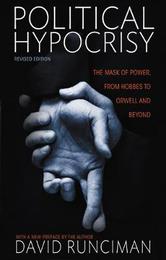
|
Political Hypocrisy: The Mask of Power, from Hobbes to Orwell and Beyond, Revised Edition
Paperback / softback
Main Details
| Title |
Political Hypocrisy: The Mask of Power, from Hobbes to Orwell and Beyond, Revised Edition
|
| Authors and Contributors |
By (author) David Runciman
|
|
Foreword by David Runciman
|
| Physical Properties |
| Format:Paperback / softback | | Pages:300 | | Dimensions(mm): Height 203,Width 133 |
|
| Category/Genre | Social and political philosophy |
|---|
| ISBN/Barcode |
9780691180854
|
| Classifications | Dewey:320.101 |
|---|
| Audience | |
|---|
| Edition |
2nd New edition
|
| Illustrations |
1 b/w illus.
|
|
Publishing Details |
| Publisher |
Princeton University Press
|
| Imprint |
Princeton University Press
|
| Publication Date |
10 July 2018 |
| Publication Country |
United States
|
Description
What kind of hypocrite should voters choose as their next leader? The question seems utterly cynical. But, as David Runciman suggests, it is actually much more cynical to pretend that politics can ever be completely sincere. Political Hypocrisy is a timely, and timeless, book on the problems of sincerity and truth in politics, and how we can deal with them without slipping into hypocrisy ourselves. Runciman draws on the work of some of the great truth-tellers in modern political thought--Hobbes, Mandeville, Jefferson, Bentham, Sidgwick, and Orwell--and applies his ideas to different kinds of hypocritical politicians from Oliver Cromwell to Hillary Clinton. He argues that we should accept hypocrisy as a fact of politics--the most dangerous form of political hypocrisy is to claim to have a politics without hypocrisy. Featuring a new foreword that takes the story up to Donald Trump, this book examines why, instead of vainly searching for authentic politicians, we should try to distinguish between harmless and harmful hypocrisies and worry only about the most damaging varieties.
Author Biography
David Runciman is professor of politics at the University of Cambridge and a fellow of Trinity Hall. His books include The Confidence Trap and The Politics of Good Intentions (both Princeton). He writes regularly about politics for the London Review of Books.
Reviews"One of Sunday Times's Best Books in Politics for 2008" "A very intelligent, subtle, and learned guide to the classics and to the pre-eminent historical examples of hypocrisy from Mandeville and Hobbes to Jefferson and the Victorians."---David Martin, Times Literary Supplement "[Political Hypocrisy] is highly readable and contains a plethora of shrewd and quotable remarks. . . . What struck a chord with me was [Runciman's] gentle demolition of the idea that a politician's profession of his own sincerity, or passionate belief, proves anything at all."---Samuel Brittan, Financial Times "Journalists and pundits notoriously pounce on any evidence of hypocrisy. . . . Runciman takes a far more textured, sophisticated approach to the phenomenon inPolitical Hypocrisy, a timely, long overdue study of one of public life's in-your-face puzzles."---Carlin Romano, Philadelphia Inquirer "A subtle, impressively intelligent discussion of a topic that's on just about everybody's mind."---David Willetts, Prospect "More praise for Political Hypocrisy"---Tim Dunne, Times Higher Education "Political Hypocrisyis not just another denunciation of politicians as liars. Instead, it offers us a tour, from Hobbes and Mandeville to Bentham and Orwell. Runciman is best on the American revolutionaries and our eminent Victorians, perhaps because both the US war of independence and British empire required self-aware democratic politicians to gloss over the gaps between their proclaimed beliefs and their actual behaviour."---Richard King, Australian Literary Review "Runciman's book should be appreciated for its attempt to present an alternate--and historical--approach to the issue of political hypocrisy. He successfully delves into the many fine distinctions that make up each theorist's approach and response to hypocrisy, which is particularly useful for a topic that so utterly lacks a clear division between black and white, and what is right and wrong."---Kiku Huckle, Peace and Justice Studies
|